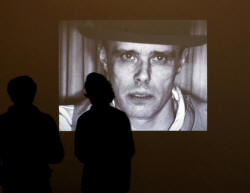|
 Beuys
film depicts German artist as laughing revolutionary Beuys
film depicts German artist as laughing revolutionary
 Send a link to a friend
Send a link to a friend
[February 16, 2017]
By Michael Nienaber and Swantje Stein
BERLIN (Reuters) - A
documentary about German conceptual artist Joseph Beuys
wowed the audience at its world premiere in Berlin,
depicting him as a creative wizard and provocative
prankster who enjoyed challenging traditional thinking
about art, politics and money.
|
|
 The film by award-winning director Andres Veiel shows the
contradictory path of a man who voluntarily joined the Hitler
Youth and fought in World War Two, only to become one of
Germany's most experimental artists and a vocal proponent of
self-determination and grassroots democracy. The film by award-winning director Andres Veiel shows the
contradictory path of a man who voluntarily joined the Hitler
Youth and fought in World War Two, only to become one of
Germany's most experimental artists and a vocal proponent of
self-determination and grassroots democracy.
"I was very interested in showing his wounds and trauma as being
connected to his energy," Veiel told Reuters in an interview on
Wednesday.
"You can only understand Beuys if you realize that (in life) he
sped toward the abyss like a stuka fighter just to pull up in
the nick of time before the plane crashes and he hits the
ground. It is this energy that kept him fighting in life."
During wartime, Beuys indeed survived a fighter jet crash on the
Crimean peninsula.

Based on archive footage, audio recordings, interviews and
photos, the film sheds light on the question why sculptures like
the fat chair were ridiculed in Germany but celebrated in an
exhibition at the Guggenheim Museum in New York.
It shows how German critics try to make sense of Beuys, his
concept of art and his light-hearted approach of doing things
differently - as manifested in his ground-breaking mass
tree-planting installation "7000 Oaks" for the Documenta
exhibition in 1982.
In one of his first installations, Beuys is seen talking to a
dead hare on his arm, explaining pictures to the lifeless animal
and petting the furry body behind a shopping window. Spectators
watch him with a mixture of disbelief and amusement.
[to top of second column] |

"Do you want a revolution without laughter? I don't!" Beuys, known
for a trademark hat that he wore at all times, tells an art critic
during a television show in another scene.
Director Veiel said he was fascinated by Beuys' political thinking
and visionary power, warning already back in the 1980s that money
was becoming a commodity and that financial speculation could
undermine democracy.
"He was way ahead of his time, he basically saw it all coming, the
financial crisis and the crisis of capitalism", Veiel said during a
news conference. Beuys died in 1986.
"Beuys" is the only documentary among the 18 films that compete for
the Golden and Silver Bears at this year's Berlinale. The winners
will be announced on Saturday.
In 2001, Veiel won the European Film Award for Black Box Germany, a
documentary about the assassination of former Deutsche Bank boss
Alfred Herrhausen and the police shooting of Wolfgang Grams, a
member of the RAF militant group.
(Writing by Michael Nienaber; Editing by Toby Chopra)
[© 2017 Thomson Reuters. All rights
reserved.] Copyright 2017 Reuters. All rights reserved. This material may not be published,
broadcast, rewritten or redistributed. |